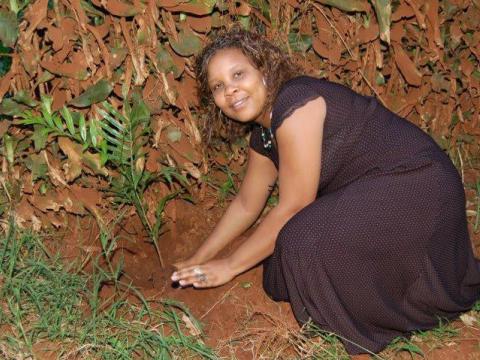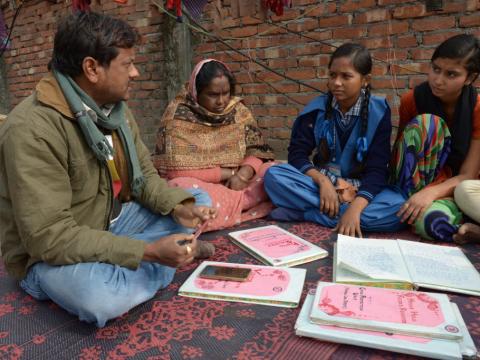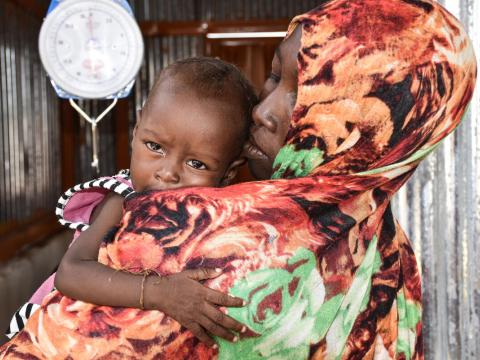
Climate change: We have the tools to reverse the climate change as a driver of hunger and poverty, if we act now!
Climate change as push factor: The global hunger and poverty crisis
The data speaks for itself:
-
The Global Report on Food Crises (GRFC) 2022 reports that close to 193 million people are acutely food insecure and in need of urgent assistance.
-
The shock of food price rises due to the Ukraine Crisis is also exacerbating poverty and hunger in the fragile contexts affected by climate change impacts.
-
By 2050, the World Bank estimates that an additional 143 million people across sub-Saharan Africa, South Asia and Latin America could be internally displaced as a result of slow onset impacts of climate change including water stress, crop failure and sea-level rise.
Children are paying the highest cost: My lived experience as a child in Zimbabwe
As a girl child, I grew up in Vhumbunu rural village, Zimbabwe, in a district that was struck by recurrent droughts year after year since 1992. This coincided with the introduction of the Economic Structural Adjustment Programs in the 90s by the government. Incentive packages were released for maize production with a guaranteed market to the Grain Marketing Board (GMB). Smallholder farmers, including my grandparents, started clearing more land to pave way for more maize production. When drought hit in 1992, rivers and boreholes quickly dried up. We lost everything including livestock. Sadly, my grandmother’s nutritious vegetable garden was abandoned as the nearby river dried up.

As rivers dried and forests depleted, we travelled longer distances to fetch water and firewood. Travelling long distances to fetch water or firewood is not safe for a girl child. Out of fear of possibility of rape or sexual abuse, we had to travel in groups to carry out these household chores. What was even frustrating are the long queues at a well which became the only source of drinking water for the community. I would spend more than four hours waiting for my turn to fetch water. The long waiting, combined with walking long distances as far as 6km with a bucket of water on top of my head left me so tired. I remember studying with my feet in water to keep myself awake.
Even today, rural households everywhere across the globe are suffering from the impacts of climate change and recurring droughts. Diyala, a male farmer in Iraq had this to say, “I have been a farmer forever. I got this land from my grandfather. There is no water now, so we cannot work on this land. My sons are now working as labourers.”
Approximately 3.2 billion people are affected by land degradation, while over 160 million children are living in areas of high level drought and highly exposed to water scarcity.
Without action on climate change, droughts will continue to intensify, land degradation and desertification will continue to accelerate, and the hunger crisis and exposure of children to different forms of violence will be further exacerbated.
Living in harmony with nature is for our own benefit.
The theme for 2022 World Environment Day, “Only One Earth” resonates with me. The earth is still our only home, and it can only give back what we give it.
Having experienced the impacts of climate change as a child, I cannot agree more that there is an urgent global outcry to stop the earth from further bleeding. Everyone has the responsibility to shift from harming the planet to healing it. There is an urgent need to protect what we have and bring back what we lost to advance to a better, more sustainable future, where everyone can thrive.
During the 1980s, my grandparents took environmental protection seriously and would regulate which tree to be cut or not on our farm. They planted diverse nutrient-dense crops such as sunflower, peanuts, vegetables, sweet potatoes. My grandmother used to make cooking oil from sunflower and peanuts seeds. As a result, I grew up as a healthy child.
We have the tools to reverse the climate as a driver, if we act now!
In the book of Genesis 2:15, God commands humanity not only to till the land but to take care of it. The Lord also encourages us to give land Sabbath rest (Leviticus 25:2-5). This is important to do because giving land rest gives cultivated fields a chance both to rest and return vital nutrients to the soil, allowing it to produce bountifully for an indefinite time. When my grandparents practiced crop rotation, we always experienced a bumper harvest and household food and nutrition security. They also practiced behavioural change practices such as erecting contours along the fields to prevent soil erosion and flooding of crops.
In World Vision, I have seen how communities who practice sustainable agriculture are rising up from drought. Compared to other farmers who use a lot of pesticides and chemicals on their farms, their agricultural production is better. For example:
-
In Zambia Farming God’s Way Gives Zambia’s Farmers a Way to End Poverty.
-
In Ghana, one beneficiary of the Farmer Managed Natural Regeneration (FMNR) approach described the outcomes: “FMNR has revolutionised my shea butter business because of increased yield from the crop. I now sell an average of four bags of pepper a day. Previously, I only could sell one bag. My pocket money has increased vastly. Because of this I am now able to provide good health care and food for my children. They have become better nourished and also immune to infections.”
Our Global Commitment
On June 17, 2022, the world will come together on the Desertification and Drought Day with the theme: “Rising Up from Drought Together.” As World Vision, we believe everyone has the responsibility to restore the earth because every child has the right to both a healthy and safe environment today and a sustainable future. The children are asking us to act now, our environmental stewardship and climate action addresses both impacts and causes of climate change, and deliver positive development outcomes for children. We also collaborate with partners to influence policy reform.
To further demonstrate our commitment to addressing climate change, World Vision is a member of the following climate change coalitions:
-
The UNEP and FAO coordinated UN Decade for Ecosystem Restoration
-
The International Partnership on Religion and Sustainable Development (PARD) together with the UNEP Faith for Earth Coalition.
For more information on World Vision’s work on climate change and environmental protection, please visit: https://www.wvi.org/our-work/climate-change



